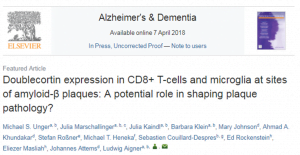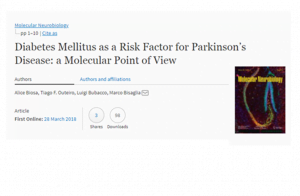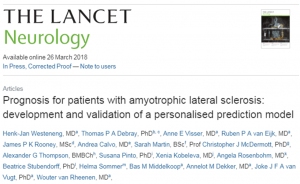Monthly Archives: أبريل 2018
Directly involving the thousands of family members and friends who serve as ‘informal carers’ for people with dementia in the evaluation of patients’ symptoms and behaviour could offer improved insights for healthcare professionals and help alleviate feelings of stress, guilt and isolation felt by many who fulfil these duties, a new study published in Dementia has found.
The findings highlight a need for more structured educational programmes covering broader knowledge around the disease for informal carers, who often have no formal training or support networks to depend on. Information on disease progression, guidelines on dealing with challenging behaviours and financial and legal advice could better prepare carers about what to expect.
The research, conducted by an inter-disciplinary team of experts, collated insights from carers and health care professionals and identified key themes which capture the main challenges faced by carers, as well as the type of support they want from health care services.
Previous research found that informal caregivers of people with dementia often display increased levels of depression and stress as well as poor self-rated health.
The new findings show that existing health and social care services are often fragmented which can make communication between healthcare professionals and care providers difficult. Healthcare professionals also stated that while they have a theoretical knowledge of the disease, they felt they often lack knowledge of how it is to live with dementia which can make it difficult to know how best to support caregivers.
The researchers say they hope that the findings will lead to improvements in dementia care with a goal of creating a better educational package for carers.
Paper: “Caregivers’ interactions with health care services – Mediator of stress or added strain? Experiences and perceptions of informal caregivers of people with dementia – A qualitative study”
Reprinted from materials provided by the University of Lincoln.
Increasing the amount of social interaction for people with dementia living in care homes to just one hour a week improves quality of life when combined with personalised care, according to a new study.
A large-scale trial found that the approach also saves money.
Previous research has found that in many care homes, residents have as little as two minutes of social interaction per day.
The new research, published in PLOS Medicine, upskilled key care home staff to deliver person-centred care. That involves simple measures such as talking to residents about their interests and involving them in decisions around their own care.
When combined with just one hour a week of social interaction, the programme improved quality of life and reduced agitation and aggression in people with dementia.
The trial involved more than 800 people with dementia across 69 care. Two ‘care staff champions’ at each home were trained over four day-long sessions to take simple measures that such as involve talking to residents about their interests and decisions around their own care. Importantly, the approach also saved money compared to standard care. Researchers say the next key challenge is to roll the programme out across care homes to benefit the lives of people with dementia living in these facilities.
Paper: “Impact of person-centred care training and person-centred activities on quality of life, agitation, and antipsychotic use in people with dementia living in nursing homes: A cluster-randomised controlled trial”
Reprinted from materials provided by University of Exeter.
After more than a decade of research, this much we know: it’s good for your brain to know another language.
A new study, published in Neuropsychologia, goes further, however, focusing specifically on the effects of knowing a second language for patients with Alzheimer’s disease (AD) and mild cognitive impairment (MCI).
Unlike previous studies using CT scans, the researchers used high-resolution, whole-brain MRI data and sophisticated analysis techniques to investigate language and cognition control areas in the frontal regions of the brain, and medial temporal lobe structures that are important for memory and are brain areas known to atrophy in MCI and AD patients.
Their sample included 34 monolingual MCI patients, 34 multilingual MCI patients, 13 monolingual AD patients and 13 multilingual AD patients.
The researchers say that their findings suggest that multilingualism is associated with increased brain plasticity and cognitive reserve. Moreover, their study indicates, they say, that people who speak more than one language may in some circumstances compensate for AD-related tissue loss by accessing alternative networks or other brain regions for memory processing, a hypothesis they hope to test in future studies.
Paper: “Structural brain differences between monolingual and multilingual patients with mild cognitive impairment and Alzheimer disease: Evidence for cognitive reserve”
Reprinted from materials provided by Concordia University.
NETCALS, and STRENGTH projects.
Scientists developing a rapid, practical test for the early diagnosis of prion diseases have modified the assay to offer the possibility of improving early diagnosis of Parkinson’s disease and dementia with Lewy bodies.
The findings were published in Acta Neuropathologica Communications.
The group tested 60 cerebral spinal fluid samples, including 12 from people with Parkinson’s disease, 17 from people with dementia with Lewy bodies, and 31 controls, including 16 of whom had Alzheimer’s disease. The test correctly excluded all the 31 controls and diagnosed both Parkinson’s disease and dementia with Lewy bodies with 93 percent accuracy.
Importantly, test results were available within two days, compared to related assays that require up to 13 days. The group conducted the tests using Real-Time Quaking-Induced Conversion (RT-QuIC), an assay developed and refined over the past decade.
Multiple neurological disorders, including Parkinson’s disease and dementia with Lewy bodies, involve the abnormal clumping of a protein called alpha-synuclein into brain deposits called Lewy bodies. The pathological processes in these diseases resemble prion diseases in mammal brains. Like prion diseases, Parkinson’s disease and dementia with Lewy bodies result in progressive deterioration of brain functions.
The researchers continue to adapt the RT-QuIC assay to detect additional types of neurological diseases with greater accuracy using the least invasive patient sample possible—whether that is blood, skin, nasal brushings, or other samples. The group also has trained many international colleagues to use and advance the test.
Article: “Rapid and ultra-sensitive quantitation of disease-associated α-synuclein seeds in brain and cerebrospinal fluid by αSyn RT-QuIC”
Reprinted from materials provided by NIH/National Institute of Allergy and Infectious Diseases.



